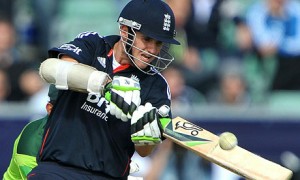
A gradual but inevitable descent into cricket-based loathing and bile.
The ‘keepers Part Two: Steve Davies
Sometimes it seems that the England selectors use some kind of randomizer to pick the team. This was more prevalent in the era before central contracts were introduced, namely the dark period of the late 1980s and early, mid and late 1990s. It’s far from a coincidence that the rise up the rankings has been concurrent with a more settled selection policy. However, even under the current, widely respected setup, the occasional puzzling decision can still be made. In particular, the chopping and changing of wicketkeepers – in all forms of the game before Matt Prior emerged as the best man in the Test match side – hindered England. So although the Test team is now settled, as is evident from other articles on this website, there are a number of candidates for the position of England’s One Day International wicketkeeper. Allied to this, were Prior to be unavailable for a Test match, it is anyone’s guess who would be called-up to fill the role.
Essentially, the keeper must at the very least be competent behind the stumps, even if the best gloveman does not necessarily get picked. This of course is due to the need for the player to be a decent batsman as well. And this correspondent thinks that the player most likely to give England the balance required is the forgotten man, Steve Davies.
In September 2010, he was picked for each of the home ODIs against Pakistan. He was then chosen in the Ashes squad as reserve to Prior. Although unneeded in the Tests, he played the first and last of the ODIs that followed (and was the original first-choice limited overs keeper until Prior was recalled) and seemed favourite to play in the World Cup; Prior’s eventual selection was reported as a surprise in most of the media.
He has played only eight ODIs in total, in which he’s scored a healthy 244 runs at an average marginally higher than Craig Kieswetter’s (30.50). His strike rate of 105.62 is better as well, 11 more runs per 100 balls than Kieswetter. Behind the stumps he averages a dismissal per innings, though from so few matches it’s hard to give much weight to that particular statistic.
Really, Davies did little wrong when given his chances, whereas Kieswetter seems to be going backwards. At 25, Davies is still young, but played responsibly for Surrey this year. His record in domestic cricket in the 2011 season was absolutely fine, though admittedly both Jonny Bairstow and Kieswetter had much better averages in the List A matches. Moreover, his first-class record is good enough to see him remain as Prior’s understudy. In the opinion of this correspondent, his batting is more rounded than Kieswetter’s and more suited to the short form than Prior’s. Should England persist with having a wannabe Adam Gilchrist, then Davies is certainly able to open the batting. Arguably, he also has the maturity and the skill to play further down the order if required (nb: this won’t be necessary).
Rather than give Prior yet another chance, or retain Kieswetter despite his obvious flaws, England should give the man who was included in the performance squad for 2011 the run in the team that his talent deserves. Hopefully, Geoff Miller still has Davies’s business card.



1 Comment
Post a Comment
1
Paul
21 Nov 2011 12:24
Couldn’t agree more. Quite what Davies has have done to offend England I do not know. He should be the number 2 keeper behind Prior, and then have Bairstow around too as a young prospect,